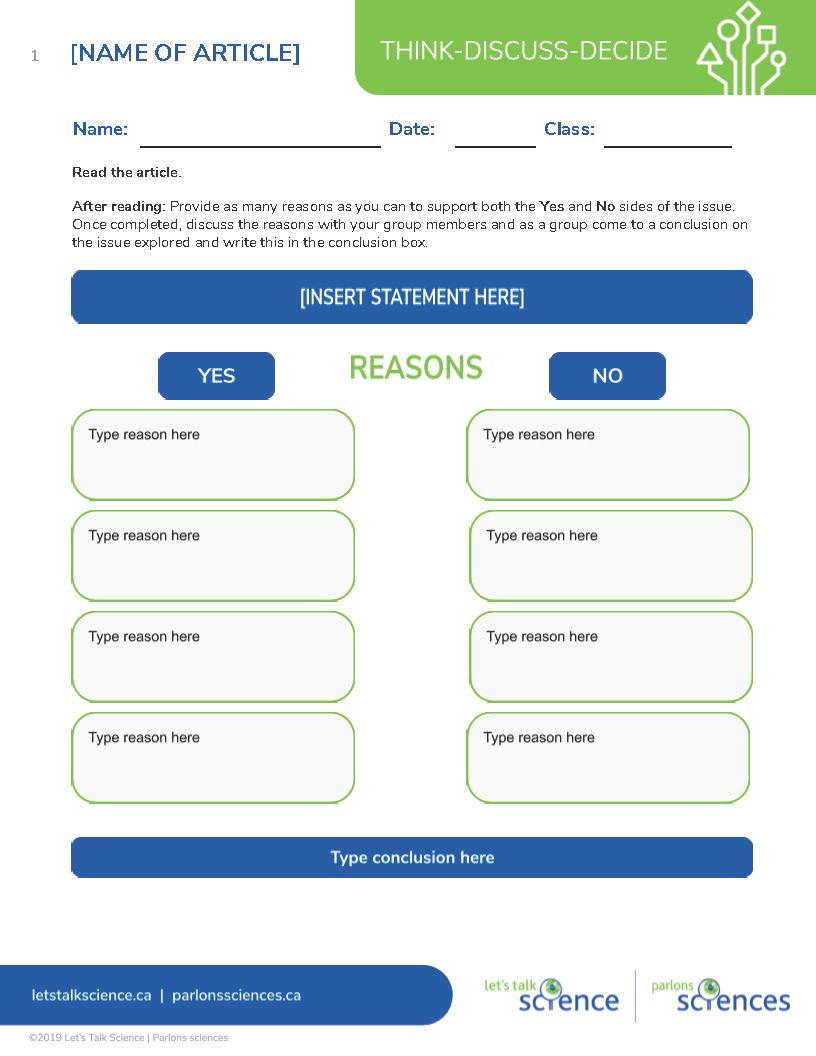Think-Discuss-Decide

Person thinking (masterzphotois, iStockphoto)

Person thinking (masterzphotois, iStockphoto)
How does this align with my curriculum?
PE
9
Science Grade 9 (revised 2018)
Decisions and Perspectives
PE
10
Science 421A (2019)
Decisions and Perspectives
PE
12
Chemistry 621A (draft 2021)
Decisions and Perspectives DP1
PE
11
Chemistry 521A (draft 2021)
Decisions and Perspectives DP1
PE
5
Integrated Curriculum Grade 5: Science (Draft 2023)
IS 1.4: Collaborating with others effectively can help us to share meaningful explorations in impactful ways.
PE
6
Integrated Curriculum Grade 6: Science (Draft 2023)
IS 1.4: Collaborating with others effectively can help us to share meaningful explorations in impactful ways.
PE
6
Integrated Curriculum Grade 6: Science (Draft 2023)
IS 1.4: Effectively communicate the results of their inquiry.
This strategy helps students develop decision-making skills as they think about and discuss issues with the aid of a graphic organizer.
Why use it?
- To engage all students in intelligent discourse and discussion about topic
- To explore issues of scientific concern or controversy
- To help students gather information (facts, statistics, examples, expert authority) and apply thinking skills (logic and reasoning) to support a collaborative conclusion to a question about an issue of concern or controversy
Tips for success
- Pick an article that presents ideas or issues which may be controversial to the reader.
- Write questions that can be answered with a Yes or No response (e.g., Should cod fishing be reinstated in the Maritimes?, Does Canada’s north need environmental protection?, Do cities need to restrict the use of personal motor vehicles?).
How do I use it?
- Have students read an article about a controversial issue.
- The teacher develops a question from the reading based on a controversial issue that can be answered with Yes or No.
- Using the Think-Discuss-Decide reproducible template (see image at right), write the question in the middle of the form.
- Have students individually write down as many Yes and No reasons as they can related to the question. The Yes reasons are written on the left side of the sheet and the No reasons are written on the right side of the page.
- Have students form small groups and discuss the various reasons so that they may explore both sides of the issue.
- Collectively, the students agree on a conclusion and write this conclusion in the box provided on the form.
- Groups can then share their conclusions with the rest of the class.

Using this Strategy
- Think-Discuss-Decide Reproducible Template [Google doc] [PDF]
- Can whales really explode?: Think-Discuss Decide reproducible [Google doc] [PDF]
- Can your own cells cure cancer?: Think-Discuss Decide reproducible [Google doc] [PDF]
- Could we stop an asteroid?: Think-Discuss Decide reproducible [Google doc] [PDF]
- Is vaping safer than smoking?: Think-Discuss Decide reproducible [Google doc] [PDF]
- The Science Behind Calories and Nutrition Facts Labels: Think-Discuss Decide reproducible [Google doc] [ PDF]
- What are carbon offsets?: Think-Discuss Decide reproducible [Google doc] [PDF]
- Why is Henrietta Lacks important?: Think-Discuss Decide reproducible [Google doc] [PDF]
- What's Special About the New COVID-19 Vaccines?: Think-Discuss Decide reproducible [Google doc] [PDF]
Create Your Own
- Think-Discuss-Decide Reproducible Template [Google doc] [PDF]
Ready to Use
- Can whales really explode?: Think-Discuss Decide reproducible [Google doc] [PDF]
- Can your own cells cure cancer?: Think-Discuss Decide reproducible [Google doc] [PDF]
- Could we stop an asteroid?: Think-Discuss Decide reproducible [Google doc] [PDF]
- Is vaping safer than smoking?: Think-Discuss Decide reproducible [Google doc] [PDF]
- The Science Behind Calories and Nutrition Facts Labels: Think-Discuss Decide reproducible [Google doc] [ PDF]
- What are carbon offsets?: Think-Discuss Decide reproducible [Google doc] [PDF]
- Why is Henrietta Lacks important?: Think-Discuss Decide reproducible [Google doc] [PDF]
- What's Special About the New COVID-19 Vaccines?: Think-Discuss Decide reproducible [Google doc] [PDF]
References
Barton, M. L., & Jordan, D. L. (2001). Teaching reading in science: A supplement to the second edition of teaching reading in the content areas teacher's manual. Mid-continent Research for Education and Learning.
Toronto District School Board. (2004). Instructional strategies for making connections in science (grade 9-12), (pp. 26-29), Toronto District School Board.